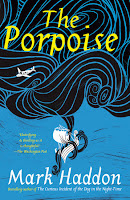64. Mark Haddon, The Porpoise (2019) (12/15/21)
This is a strange but riveting book, a portmanteau of not just two, but three stories: one present-day, set mostly in southern England; one set in the mythic past of ancient Greece; and the third taking place in Jacobean London. The framing story sees very wealthy Philippe lose his beloved, pregnant wife in a plane crash, but the baby, Angelica, survives and winds up hidden away at his estate, where he takes sexual advantage of her, as if it's perfectly normal—though as she grows into a teenager, she comes to realize it is not. She retreats into her imagination, which brings us the retelling of the story of Pericles (aka Appolonius), a Greek prince—who is morphed from a young man, Darius, who arrives at Philippe's estate and, momentarily, seems poised to rescue Angelica. Pericles's adventures, too, include the (seeming) death of his wife, Chloë, aka Emilia, and in his case the abandonment of a baby daughter, Marina. These three characters' stories make up the bulk of the book. Midway, interspersed, are a few chapters that feature (dead) Will Shakespeare and a fellow (dying, then dead) playwright (and "pimp, minor criminal, abuser of women") George Wilkins—authors of a retelling of the story of Appolonius, Pericles, Prince of Tyre.Though it sounds confusing, it isn't so long as you trust yourself to Haddon's skill with words. He is a master of description, of vocabulary, of rhythm, of suspense—and whereas the original (Wilkins/ Shakespeare) story is focused only on Pericles, in this retelling the women are given considerable agency. The Pericles/Emilia/Marina story ends on a note of hope. The Philippe/Angelica one does not—or does it? It depends on your perspective, I guess.
I flagged three passages, though I could have flagged many more for the virtuosic writing. Here's one of them:
Angelica hears the soft rip of gravel when Darius arrives and goes to the window to look, visitors being a rare entertainment. The young man who gets out of the sports car and removes a portfolio from the boot is more entertaining than she could have hoped for. He is clearly not someone employed by her father—a lawyer, a banker. He is utterly uncowed by the house and garden and looks, for all the world, as if he might own the place. Is it possible that he is a friend of the family?
His looks are unimportant. He is young and wealthy, he comes from the Great Elsewhere and there is a dash about him which suggests that in his company anything might happen. But on top of these things he happens to be almost comically handsome—slim hips, a wave of thick hair the colour of black coffee, a feline ease in his own body. She has read about Lydia Bennet's elopement with George Wickham, about Marie Melmotte falling for the rakish idiot Sir Felix Carbury but she knows little of the world and it is often hard to recognise stories when you find yourself inside them, so that by the time she has found Darius and her father sitting in the slatted sunshine of the roof terrace she is already in thrall to an imagined future in which he takes her away from all this, and the knowledge that the fantasy is ridiculous does nothing to sour its addictive sweetness.
Philippe's hackles rise as soon as she appears. If he had known a little more about Darius in advance he would have explicitly excluded her from the meeting. He says, without thinking, 'You shouldn't be here,' taking her subservience for granted. This, he will realise later, is the mistake that changes everything, goading her in front of Bobby's son.
Haddon frequently refers to such "realizations," as well as to events (usually involving death) that are about to happen, reminding the reader that the narrator is in control. And here is an example (picked at random) of Haddon's descriptive prowess:
Above him sails ripple and sway—top-gallant, topsails, courses
. . . Men spider through the rigging. He knows every inch of this ship from the stern lantern to the wooden mermaid with long tangerine hair, painted lips and full but slightly chipped wooden breasts. Three hundred and seventeen tonnes laden, nineteen carriage guns, a hold packed with bisket, Holland cheese, neats' tongues, mutton, lemons, good wine . . . and secreted under these, the Barbary gold which they have earned trading Venetian glass.


No comments:
Post a Comment